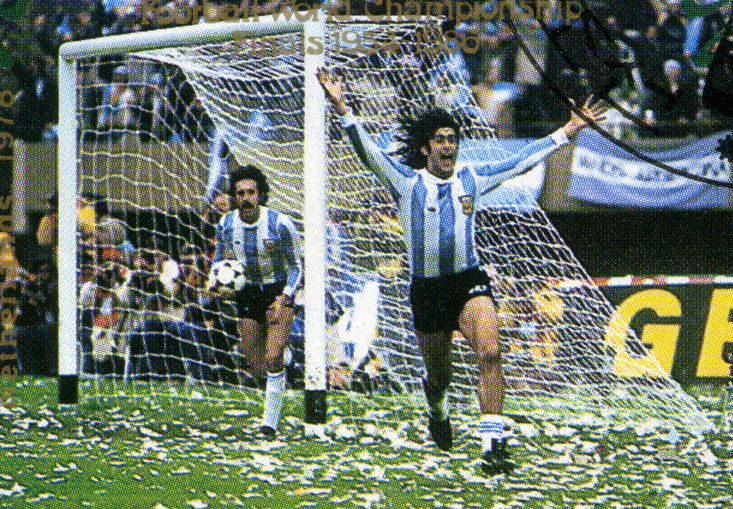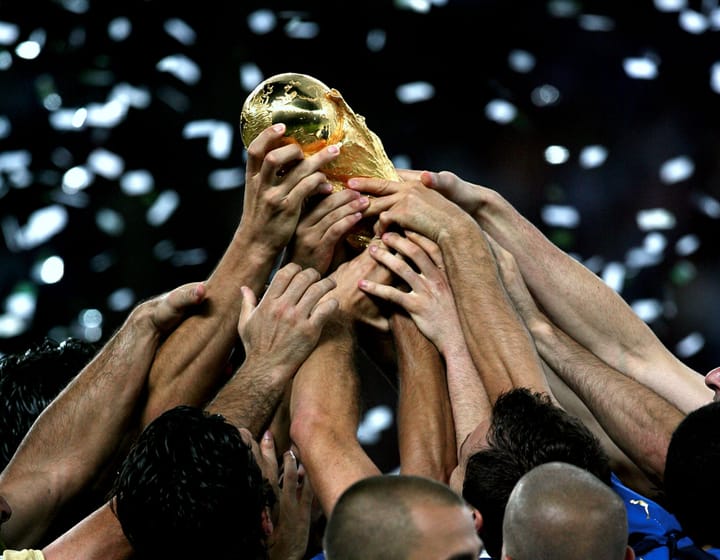Epic Encounters: The Five Most Legendary Matches in FIFA World Cup History
The Fifa World Cup has produced countless legendary matches. In this article, we pick five of them, enjoy!

The FIFA World Cup, the premier event in international soccer, has always been a stage where legends are born, heroes emerge, and epic narratives are written. This grand tournament, held every four years, has offered numerous matches that stand out in our collective memory, resonating far beyond the pitch and the ninety minutes of play.
In this article, we delve into the history books and revisit five of the most legendary matches in World Cup history. Join us as we relive these extraordinary moments, forever etched in the annals of soccer.
England-Germany 1966 World Cup Final
The 1966 FIFA World Cup final between England and West Germany was held at Wembley Stadium in London, England, on July 30, 1966. This was the eighth edition of the World Cup, and England was hosting it for the first time.
England's team, managed by Alf Ramsey and captained by Bobby Moore, played West Germany, managed by Helmut Schön. The English side was known as the "Wingless Wonders" because of Ramsey's unconventional 4-4-2 system, which eschewed traditional wingers.
Helmut Haller opened the scoring for West Germany in the 12th minute, but Geoff Hurst equalized for England six minutes later. Martin Peters then put England in the lead in the 78th minute, but Wolfgang Weber scored a late equalizer for West Germany in the 89th minute, sending the match into extra time.
One of the most famous moments of the match came in the 101st minute, when Geoff Hurst's shot hit the underside of the crossbar, bounced down onto the goal line, and was cleared. The referee, Gottfried Dienst, was unsure if the ball had crossed the line and consulted his linesman, Tofiq Bahramov from Azerbaijan, who indicated that it was a goal. The decision remains controversial to this day, with debates about whether the ball fully crossed the line.
Geoff Hurst went on to score another goal in the 120th minute, completing the first and still the only hat-trick in a World Cup final. The match ended with England winning 4-2 after extra time, securing their first and, as of 2021, only World Cup title.
The 1966 World Cup final is considered one of the greatest matches in the history of the tournament. Geoff Hurst's controversial second goal and the dramatic circumstances of England's victory have ensured that the match continues to be discussed and analyzed. The match ball, the "Challenge 4-Star" ball, which was made by Slazenger, and Hurst's red and white shirt are among the most treasured artifacts in the history of soccer.
Italy-Brazil 1982 World Cup Quarterfinal
The 1982 FIFA World Cup quarterfinal between Italy and Brazil, held at the Estadio Sarrià in Barcelona, Spain, on July 5, 1982, is remembered not only for the result but also for the high quality of soccer and the tactical duel that was displayed.
Brazil's squad, managed by Telê Santana, was hailed as one of the best ever, boasting talented players such as Zico, Sócrates, and Falcão. Their attacking flair and expressive style of play had made them tournament favorites.
Italy, managed by Enzo Bearzot, had a more balanced and defensive style, with a focus on tactical discipline. Their team featured top players like Dino Zoff, Marco Tardelli, and Paolo Rossi, who had just returned from a two-year ban for a match-fixing scandal.
The game was a classic showdown of attack versus defense, of Brazil's attacking prowess against Italy's resolute defense and swift counter-attacks. Paolo Rossi opened the scoring for Italy in the 5th minute, capitalizing on a defensive error from Brazil. Sócrates equalized for Brazil in the 12th minute, but Rossi again put Italy ahead in the 25th minute. Brazil then equalized again, this time through Falcão in the 68th minute. However, Rossi completed his hat-trick in the 74th minute, securing a 3-2 win for Italy.
Rossi's performance in this match is often seen as one of the greatest in World Cup history. After struggling in the early stages of the tournament, he scored a hat-trick against a Brazil team widely regarded as one of the best ever. Rossi's goals secured a victory for Italy and propelled them to the final, which they won, securing their third World Cup title.
This match is often remembered as the day that Brazil's beautiful, attacking style of play was defeated by Italy's more pragmatic approach. It also marked a turning point in the career of Paolo Rossi, who went on to win the Golden Boot as the tournament's top scorer and the Golden Ball as the best player. This match is frequently cited in discussions about the "right" way to play soccer and the tension between playing attractively and playing effectively.
Germany-France, 1982 World Cup semi-final
The 1982 FIFA World Cup semi-final between West Germany and France is considered one of the most dramatic and controversial matches in World Cup history. The game was played on July 8, 1982, at the Ramón Sánchez Pizjuán Stadium in Seville, Spain.
The game saw an early lead for the Germans with a goal from Pierre Littbarski in the 17th minute, but Michel Platini equalized for France with a penalty in the 26th minute. The match remained tied 1-1 at the end of regular time, pushing it into extra time.
The most controversial moment of the match happened in the 57th minute of the game. French substitute Patrick Battiston was clean through on goal when German goalkeeper Harald Schumacher rushed out of his box and collided with him. Battiston was knocked unconscious, lost two teeth, and later slipped into a coma. Schumacher's action was seen by many as a violent foul, but the referee did not penalize him, causing outrage among the French team and fans.
During extra time, France went ahead with goals from Marius Trésor and Jean Tigana. However, West Germany fought back with goals from Karl-Heinz Rummenigge and Klaus Fischer to make it 3-3, leading to the first-ever penalty shootout in a World Cup.
In the shootout, Schumacher, the controversial figure from earlier, made two crucial saves, allowing West Germany to win the shootout 5-4, and securing a place in the final, which they eventually lost to Italy.
This game is still remembered for its high drama, the controversial Schumacher-Battiston incident, and the first use of a penalty shootout to decide a World Cup match. The game further inflamed the competitive rivalry between France and Germany. The lack of punishment for Schumacher remains a contentious point in World Cup history, with many feeling it was one of the tournament's most glaring examples of a referee's mistake.
Brazil-Germany: 2014 World Cup Semi Final
The 2014 FIFA World Cup semi-final match between Brazil and Germany, held on July 8, 2014, at the Estádio Mineirão in Belo Horizonte, Brazil, is one of the most infamous matches in the history of the tournament. It is widely remembered for Germany's stunning 7-1 victory over Brazil, the tournament's host nation.
Brazil came into this match without two of their key players - their star striker Neymar, who had been injured in the previous game against Colombia, and their captain Thiago Silva, who was suspended due to accumulated yellow cards. Still, with home advantage and a rich soccer history, Brazil was considered a strong competitor.
However, Germany, managed by Joachim Löw, produced a masterful performance. They took the lead in the 11th minute through a goal by Thomas Müller. This was followed by a remarkable period in the first half where Germany scored four goals in six minutes (from the 23rd to the 29th minute), with Miroslav Klose, Sami Khedira, and Toni Kroos (2 goals) finding the net. Klose's goal also made him the highest-scoring player in World Cup history, surpassing Brazil's Ronaldo.
The first half ended 5-0, leaving Brazil's players and fans in shock. In the second half, Germany added two more goals through André Schürrle, before Oscar scored a consolation goal for Brazil in the 90th minute, making the final score 7-1.
This was Brazil's worst defeat in World Cup history and ended their 62-match unbeaten run at home in competitive matches since 1975. It was also the largest margin of victory in a World Cup semi-final, and it equaled the record for the biggest win in a World Cup knockout stage match.
The match is often referred to as the "Mineirazo", drawing parallels with the "Maracanazo" – the unexpected loss by Brazil against Uruguay in the final match of the 1950 World Cup. It left a deep scar in Brazil's soccer psyche, and the term "7-1" has since become synonymous in Brazil with a shocking, overwhelming defeat. For Germany, the match was a testament to their power and efficiency, and they went on to win the tournament, beating Argentina 1-0 in the final.
Argentina-France: 2022 World Cup Final
The 2022 FIFA World Cup final between Argentina and France took place on December 18, 2022, at Lusail Iconic Stadium in Qatar. This was a significant match in the tournament's history for several reasons. Not only was it the first time these two teams met in a World Cup final, but it was also the first time a Middle Eastern nation hosted the tournament.
The match was a hard-fought battle, characterized by the free-flowing, attacking soccer both teams had shown in the tournament up until that point.
Argentina looked to have an easy match when they scored two goals in the first half, one from the penalty spot by Lionel Messi. In the second half, Argentina were on course for the win, controlling possession and defensively shutting down France, who failed to make an attempt on goal until the 80th minute, at which point France was awarded a penalty after Randal Kolo Muani was brought down in the penalty area. Kylian Mbappé converted the penalty kick and scored Immediately after to draw the game level. With the score tied at the end of regulation time, the match went to extra time.
Messi scored again for Argentina in the second period of extra time when he finished from close range after Lloris had parried a shot from Lautaro Martínez on the right, in what seemed to be the winning goal. However, France was awarded a second penalty in the 118th minute after a shot by Mbappé hit the arm of Gonzalo Montiel. Mbappé scored his third goal with his penalty kick to the left, sending Martínez the wrong way and becoming the second player to score a hat-trick in a men's World Cup final after Geoff Hurst for England in 1966.
This was the third time the World Cup final would be decided on penalties. Mbappé and Messi successfully converted the first two attempts in the penalty shootout, but Kingsley Coman's attempt was saved by Argentina goalkeeper Martínez down low to his right. Dybala sent a shot into the net up the middle to give Argentina a 2-1 lead. Aurélien Tchouaméni then sent his shot wide of the goal to the left, and Leandro Paredes scored to put France on the brink of defeat at 3-1. Kolo Muani kept France alive by scoring his chance, setting up a chance for Montiel to make up for his late handball by clinching the championship for Argentina. Montiel scored low to the left, giving Argentina their third World Cup trophy and first since 1986.
The 2022 World Cup final is remembered for its high level of intensity and drama, two late equalizers, and a nail-biting penalty shootout. The victory cemented Argentina’s status as the dominant soccer nation of that period and Lionel Messi as the greatest soccer player of all-time.




